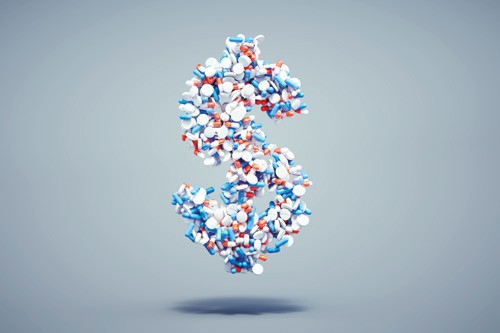
The return on investment in R&D by the top 12 companies in the pharma industry is at its lowest level for eight years, at just 3.2% of spending, says a new report.
That is a big reduction from the 10.1% return in 2010, made even more serious by a massive increase in the cost of bringing a new drug to market, now almost $2bn compared to $1.2bn in 2010 when the annual survey – by Deloitte’s Centre for Health Solutions – was first conducted.
Last year that figure was just over $1.5bn, and big increase in just one year is attributed to a decline in the number of drugs in the late-stage pipeline, which is down 16% on 2016 with 159 candidates across the industry.
One slightly bright spot in the data comes from Deloitte’s analysis of average peak sales per asset, which has risen from $394m last year to $465m but still lags well behind the $816m figure reported in 2010 and that overall decline contributes to the low internal rate of return.
The data is “a stark reminder that investing in R&D is a high-risk, high-reward endeavour”, according to Colin Terry, consulting partner for European life sciences R&D at the accounting organisation, who suggests that the industry is facing big challenges including “increased competition, expiring patents, declining profitability, mounting regulatory scrutiny, and arguably the most heated issue – pricing”.
This year’s analysis provides some other interesting observations, including that smaller companies seem to outperform their larger peers. Four second-tier companies added to the survey in 2014 – AbbVie, Celgene, Biogen and Gilead – had an average ROI of 11.9%, almost four times the industry average this but still down on three years ago when they were projected 17.7%.
Meanwhile, the pharma industry as a whole has turned its attention to cancer, with oncology projects now accounting for 37% of the total late-stage pipeline, up from 18% in 2010, and some other areas – particularly cardiovascular – in steep decline.
The report notes however that it would be a mistake to use these projected financial returns as the only measure of the industry’s ability to innovate, with new developments such as this year’s approval of CAR-T cancer immunotherapies and the first digital pill “examples of innovation that demonstrate biopharma’s resilience”.
Deloitte also welcomes an increase in the number of approvals of new molecular entities, orphan drugs and break/fast-tracked therapies which its says “leads us to present an overall optimistic view of biopharma’s potential, although in our view, much improvement is still needed across R&D to balance revenues and costs”.
A transformation in the R&D process through the use of technologies such as artificial intelligence, real-world evidence and robotic and cognitive automation could help improve R&D efficiency, along with new ways of engaging patients in clinical trials such as social media, mobile health and wearables/connected devices.
“Applying these technologies could lead to a vibrant and sustainable biopharma industry focused on high value outcomes – an objective that is vital to the future of global public health,” it concludes.




